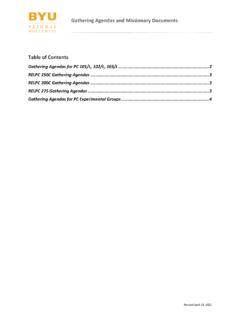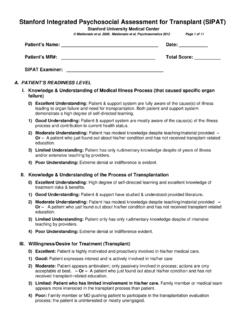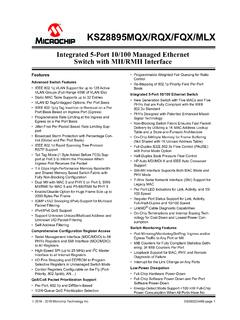Transcription of THE 7 HABITS OF HIGHLY EFFECTIVE PEOPLE
1 THE 7 HABITS OF HIGHLYEFFECTIVE PEOPLEAn Approach To Solving Personal and Professional ProblemsSTEPHEN R. is a concentrated business information service. Every week, subscribers are e-mailed aconcise summary of a different business book. Each summary is about 8 pages long and contains thestripped-down essential ideas from the entire book in a time-saving format. By investing less than one hourper week in these summaries, subscribers gain a working knowledge of the top business titles. Subscriptions are available on a monthly or yearly basis. Further information is available at COVEY is co-founder and co-chairman of FranklinCovey Company, the world s largestmanagement and leadership development company. He is also the author or coauthor of Principle-CenteredLeadership, First Things First, Daily Reflections For HIGHLY EFFECTIVE PEOPLE , The 7 HABITS of HIGHLY EffectiveFamilies and First Things First Every Day.
2 Dr. Covey is a graduate of the University of Utah, HarvardBusiness School and Brigham Young 7 HABITS Of HIGHLY EFFECTIVE PEOPLE - Page 1 Main ThemeThe 7 HABITS provide an incremental, sequential, integrated approach to the development of personal effectiveness moving usprogressively from dependence (on others) to independence (taking care of ourselves) to interdependence (looking after others and combining strengths to multiply our individual effectiveness).The first three HABITS are the basis for private victories in which we develop the fiber of our own character second three HABITS are for public victories, those situations where we work with other final habit improves the effectiveness of our lives in all 7 HABITS give the ability to work from the inside out to build character of total VictoryHabit 3 Put first things 2 Begin with the end in 1 Be VictoryHabit 6 5 Seek first to understand.
3 Then to be 4 Think EffectivenessHabit 7 Sharpen the and 2 The Seven HABITS An 3 Habit 1 Be 3 Habit 2 Begin with the end in 4 - 5 Habit 3 Put first things 5 Public Victory ..Page 5 Habit 4 Think 6 Habit 5 Seek first to understand, then to be 6 - 7 Habit 6 7 Habit 7 Sharpen the 7 - 8 Inside Out 8 Paradigms and PrinciplesMain IdeaA paradigm is the way we see and understand the world aroundus. It is a mental map by which we interpret the information wereceive. Paradigms hold the key to our own personalinterpretation of reality. Principles are guidelines for humanbehavior that have been proven over time to have enduring,permanent value. Our challenge is to develop paradigms for ourown lives that are principle IdeasMany individuals who have achieved incredible degrees ofoutward success find themselves struggling with an inner needfor healthy, growing relationships with other PEOPLE .
4 These arethe sorts of problems quick fixes cannot solve. An academic study was recently made on how perceptions wereformed, and how the way events are viewed governs led to a study of expectancy theory and self-fulfillingprophecies. The study concluded that no matter how much aperson works on their attitude, they won t change if they don tchange their perceptions. Much of the success literature of the past 50 years has beenextremely superficial - filled with social image consciousness and quick-fixes. On the other hand, success literature for the previous 150 years focused on the character ethic as the foundation ofsuccess - things like integrity, humility, fidelity, justice, patienceand the Golden Rule. The character ethic taught there are basic principles of effectiveliving, and that PEOPLE can only experience true success andenduring happiness as they integrate those principles into theirpersonal character.
5 After World War I, the basic view of successshifted from the character ethic to the personality ethic. Successbecame a mere function of personality, public image, attitudesand skills. This involved public relations techniques and positivemental attitude. Some parts of the personality ethic are clearly manipulative oreven deceptive. Sometimes character was acknowledged, but itwas not considered fundamental to overall success. Whilefleeting reference was made to it, the general approach could bedescribed as influence techniques, power strategies,communication skills and positive attitudes. Perhaps in building upon the foundation of generations before us, we have inadvertently become so focused on the secondarytraits that we have forgotten the primary traits at the focus on techniques alone is to miss the whole point of why the techniques are useful. In the long run, we cannot be successful ifthere is no actual foundation for success.
6 It is the crammingapproach to getting grades in school. In the final analysis, whatwe are communicates far more eloquently than anything we sayor do. There are some PEOPLE we trust absolutely because weknow their character. Whether they are eloquent or not, or havehuman relations skills or not, we trust them and work successfully with them. The seven HABITS embody many of the fundamental principles ofhuman effectiveness. They represent the internalization ofcorrect principles upon which enduring happiness and successare based. Before studying them, consider the power of aparadigm. A paradigm is like a map. It is not the actual piece ofterritory but is an explanation or model of a piece of territory. Everyone carries with them mental maps of two types - the waythings are and the way things should be. We often assume theway we see things is the way they really are. All our attitudes andbehaviors grow out of those assumptions.
7 They also affect theway we interact with other PEOPLE . In other words, sincere, clearheaded PEOPLE can each see the same thing differently becauseeach person is looking through the unique lens of their ownexperience. The more anyone becomes aware of their own paradigms andthe extent to which they influence their perceptions, the more that person can take responsibility for their paradigms and test themagainst reality and try to perceive the larger picture for a moreobjective view. In the book The Structure of ScientificRevolutions, Thomas Kuhn showed almost every significantbreakthrough in the field of scientific endeavor is first a break with tradition, with old ways of thinking, with old paradigms. Paradigm shifts, whether instantaneous or gradual, positive ornegative affect the way we see the world, and therefore ourattitudes and behaviors and relationships with other , if we want to make changes in our lives, we can do so byfocusing on our paradigms.
8 Paradigms are inseparable from ourcharacter. The character ethic is based on the fundamental idea that thereare principles that govern human effectiveness - natural laws that are just as unchanging as laws in the physical dimension. Thedegree to which our own mental paradigm accurately describesthe reality does not alter its existence. True principles surface again and again in the cycles of socialhistory. In fact, PEOPLE are either moving towards survival whenthey live in harmony or destruction when they move are principles such as;nFairnessnIntegritynHonestynHuman dignitynServicenQuality or excellencenHuman potential Principles are not practices (specific activities that work in certain circumstances). Nor are they values (which are simply maps ofprinciples). Seen in this light, the glitter of the personality ethic isthat there is some shortcut, a get-rich-quick scheme to achievequality of life without paying the price.
9 It is illusory and way we see any problem is the problem. The 7 HABITS are a new level of thinking - a paradigm shift basedon a principle-centered, character-based inside-out approach topersonal Thoughts There is no real excellence in all this world which can be separatedfrom right living. David Starr Jordan Into the hands of every individual is given a marvelous power forgood or evil - the silent, unconscious, unseen influence of his is simply the constant radiation of what man really is, not whathe pretends to be. William George Jordan The significant problems we face cannot be solved at the same level of thinking we were at when we created them. Albert Einstein We must not cease from exploration and the end of all our exploringwill be to arrive where we begun and to know the place for the firsttime. T. S. EliotThe 7 HABITS Of HIGHLY EFFECTIVE PEOPLE - Page 2 The Seven HABITS - An OverviewMain IdeaThe 7 HABITS provide an incremental, sequential, integratedapproach to the development of personal effectiveness movingus progressively from dependence (on others) to independence(take care of ourselves) to interdependence (looking after othersand combining strengths).
10 Supporting IdeasOur character is basically a composite of our HABITS . HABITS arepowerful factors in our lives because they express our characterand produce our effectiveness. A habit can be defined as theintersection of knowledge (the what to do), skill (how to do it) anddesire (the motivation to do it). We need all three to form a can be defined as the fruit of the ability to sacrificewhat we want now for what we want eventually. Trueindependence of character empowers us to act rather than beacted upon. However, life is, by its very nature, highlyinterdependent. Much more can be achieved throughinterdependence. It opens the opportunity to share meaningfullywith others, and provides access to the vast resources andpotential of other PEOPLE . You can t be effectively interdependentuntil you are truly 1,2 and 3 deal with self-mastery or private victoriesand lay the foundation for other HABITS .













